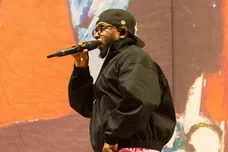Across all facets of the entertainment sphere, shock value has proved to be worth its weight in gold. The catalyst for legions of concerned parents and conservative moral outrage, it’s an age-old showbusiness trope that has played an instrumental part in the legacies of punk trailblazers, daring filmmakers and even the one-time agitator turned elder statesman Eminem. In the same vein as how a young Em used the debased and puerile to his advantage, a voyage into the darker underbelly of the psyche also propelled Tyler, The Creator on to the world’s stage.
Rich Fury/Getty Images
Filled with nihilistic vitriol and brutal depictions of murder, rape and anything else that he deemed fitting, the man from Ladera Heights harnessed the galling power of his most depraved thoughts and positioned them at the forefront of his music. Tyler’s debut project Bastard, shared with the world on Christmas day 2009, set the tone for what was to come. A prodigious sonic feat cloaked in introspective and at times vengeful lyricism, the first instalment of the therapy sessions between Tyler-- or his villainous alter ego Wolf Haley-- and “DR.TC” would be the rebellious spark that put him and his Odd Future Wolf Gang Kill Them All affiliates on the map.
Laden with poignant piano chords and warped synths, each track bristled with the sort of volatile energy that’s been insatiably attractive to receptive teenage minds since youth culture arose in the '50s. Formed under the proviso that “I feel we’re more talented than 40-year-old rappers talking about Gucci,” the group would soon become synonymous with an anti-establishment spirit that was so neatly summarized on Tyler’s major label debut Goblin:
"Kill People, Burn Shit, F**k School."
As their fame continued to morph and mutate, this epithet came to define OFWGKTA’s heyday and garnered them an audience that ranged from hip-hop heads to more indie-rock oriented consumers that were soon donning their Supreme box logos and emulating their newfound heroes.
Built on a reputation for chaotic live shows and misbehaviour, their fans’ cult-like devotion emboldened the group’s ringleader and his diverse array of cronies to do anything they’d like in the realms of music, fashion and even television. Reviled by LGBTQ+ organizations for their flagrant use of homophobic slurs, the macabre sentiments and moral deconstructivism of Tyler’s early work led to innumerable calls for boycotts and bans from both the UK and Australia. Yet just like all artists that are catapulted into view on a wave of dissension, the effects of outrage as a career accelerant eventually tapers off and by the release of 2012’s OF Tape Vol 2, the sun was setting on the collective’s heyday as a genuine phenomenon.
Unburdened by the weight of the group and the accompanying stigma, Tyler and cohorts such as Earl Sweatshirt, Syd of The Internet and Domo Genesis have gone on to make music that is diametrically different to that which they’d rose to prominence from. But while each of these metamorphic journeys have been exciting to behold, none has been quite as thrilling as Tyler’s shift from a vessel for youthful indignance into a high calibre artist. Once motivated by a desire to make “shit to piss off old white people,” the man lesser-known as Tyler Okonma has re-emerged anew and with a drastically shifted focus. However, what makes his evolution so compelling to witness is that hasn’t been governed by any prevailing trends or compliance with the commercial landscape.
In a recent video entitled “How To Make A Tyler, The Creator Song”, musician Left At London playfully satirizes the Golf Wang figurehead’s change in tact as she describes how he went from a "homophobic psychopath to a lonely gay man who made the Grinch soundtrack."
Comical as that statement may be, it contains more than a few morsels of truth and depicts just how sharp these recent shifts in his career path have been.
John Lamparski/Getty Images
Released after the critical and commercial low ebb of 2015’s Cherry Bomb, Tyler constructed a redemptive tale on 2017’s LP Flower Boy. A conceptual and musical departure from the provocations of old, Tyler’s new album eschewed the guises and misdirects of the previous era in favour of unreserved honesty. A wistful and contemplative project, it took his longstanding affinity for the serene beauty of soul music and the pioneering sound of jazz-fusion legend Roy Ayers’ to its logical conclusion. Save for the A$AP Rocky-assisted “Who Dat Boy” and “I Ain’t Got Time,” much of the splintering abrasion that was a staple of his earlier work has been side-lined in favour of off-kilter melodies and vibrant production.
Exhibited on many of Cherry Bomb’s finest offerings-- including “Find Your Wings,” “Keep Da O’s” and the Yeezy and Weezy-aided “Smuckers,” his penchant for grand, sweeping arrangements came to its logical conclusion on Flower Boy. Although it took many aback, any long-term fan of Tyler was already aware that he had the capabilities to create works of musical beauty. Among all of the misanthropic statements on Bastard, its blunt revelations were offset by the emergence of soaring chord progressions. Exhibited across Goblin and the trilogy-concluding Wolf on tracks such as “She,” “Nightmare” “48” and “Slater,” his tendency to incorporate these moments of splendour amid the animosity of his lyrics came from influences that extended far beyond the hip-hop purview.
As detailed to The Guardian in 2011, the sounds that brewed in the background of his music came from a love of the dreamy terrain of shoegaze and chillwave:
"I listen to Washed Out, Beach House and Broadcast. That's what I'm influenced by. [That's why] the music is a mixture of pretty chords, fuckin' hardcore drums and basslines, and really nice strings."
Aside from his well-publicized love of Pharrell and N.E.R.D, it is these influences that permeate through most regularly in his output and this doesn’t seem to be subject to change. Set to be released this Friday (May 17), the teasers for Tyler’s new album IGOR have all featured fragments of that sound while harbouring a brash, electronica-infused edge.
Said to feature guest appearances from alternative acts King Krule and Mild High Club, these two artists are synonymous with atmospheric, guitar-oriented output and would seamlessly slip into his aural world should the rumoured tracklist turn out to be accurate. On top of frequent collaborators such as Pharrell, A$AP Rocky, Frank Ocean and Kali Uchis, it’ll also see him team up with Playboi Carti and Brockhampton-affiliated singer/songwriter Ryan Beatty. As displayed in the teaser for the frantically paced “WHATSGOOD,” it appears that Tyler is operating with a renewed confidence and sense of defiance that he’d lost in the wake of the turgid response to Cherry Bomb:
“Y'all said I wouldn't go nowhere, took the detour
When you see the someone in the crack right by the sea shore?
When you see them brand new Le Fleurs on these floors?
If the cop says my name, bitch, I'm Igor.”
As of yet, Tyler has yet to clarify exactly what the IGOR motif is in reference to. But when viewed in conjunction with the Lewis Rossignol-devized album cover, it begins to come into focus. A surrealist portrait of Tyler, it comes with a certain level of grotesqueness and horror that makes him seem inhuman. With his cheeks wiped out and hair that protrudes into the face, it shares an unsightly quality that is in keeping with the album’s most prominent namesake. Normally depicted with a hunch and a villainous personality, Igor is a staple of Frankenstein films and classical horror. The faithful assistant to the notorious mad scientist, he’s an integral part of his schemes and-- in the Ghost Of Frankenstein-- even has his brain placed within the hulking monster’s body. Throughout Tyler’s career, he has been something of an eternal outcast and is prone to melding together sounds and textures in a way that many would deem to be unconventional. A self-confessed loner, the idea of a pariah that spends his days in a lab is one that would resonate with the restlessly creative mind. A man that’s made a living out of refusing to conform or blend in, this concept sheds light on how he’s perceived in both the media and by hip-hop’s inner circles.
For all that he’s disavowed much of his earlier music and expunged it from live sets, the evolution of Tyler, The Creator is one of the more captivating of the 21st Century. From provocateur to pop-culture icon, what’s clear upon reflection and revisiting his back catalogue is that he’s achieved the rare feat of keeping his personality intact. Although he may not be threatening the lives of B.o.B and Bruno Mars anymore, his quick-wittedness and ability to craft newsworthy soundbites has retained its potency albeit through taking different forms. More acquainted with grabbing headlines through his candidness about his sexuality and struggles with isolation of late, he may be a far cry from the man that incited a riot at SXSW but he’s all the better for it. Now, all we can do is wait for Friday and see what shape this chameleonic artist will take next.







